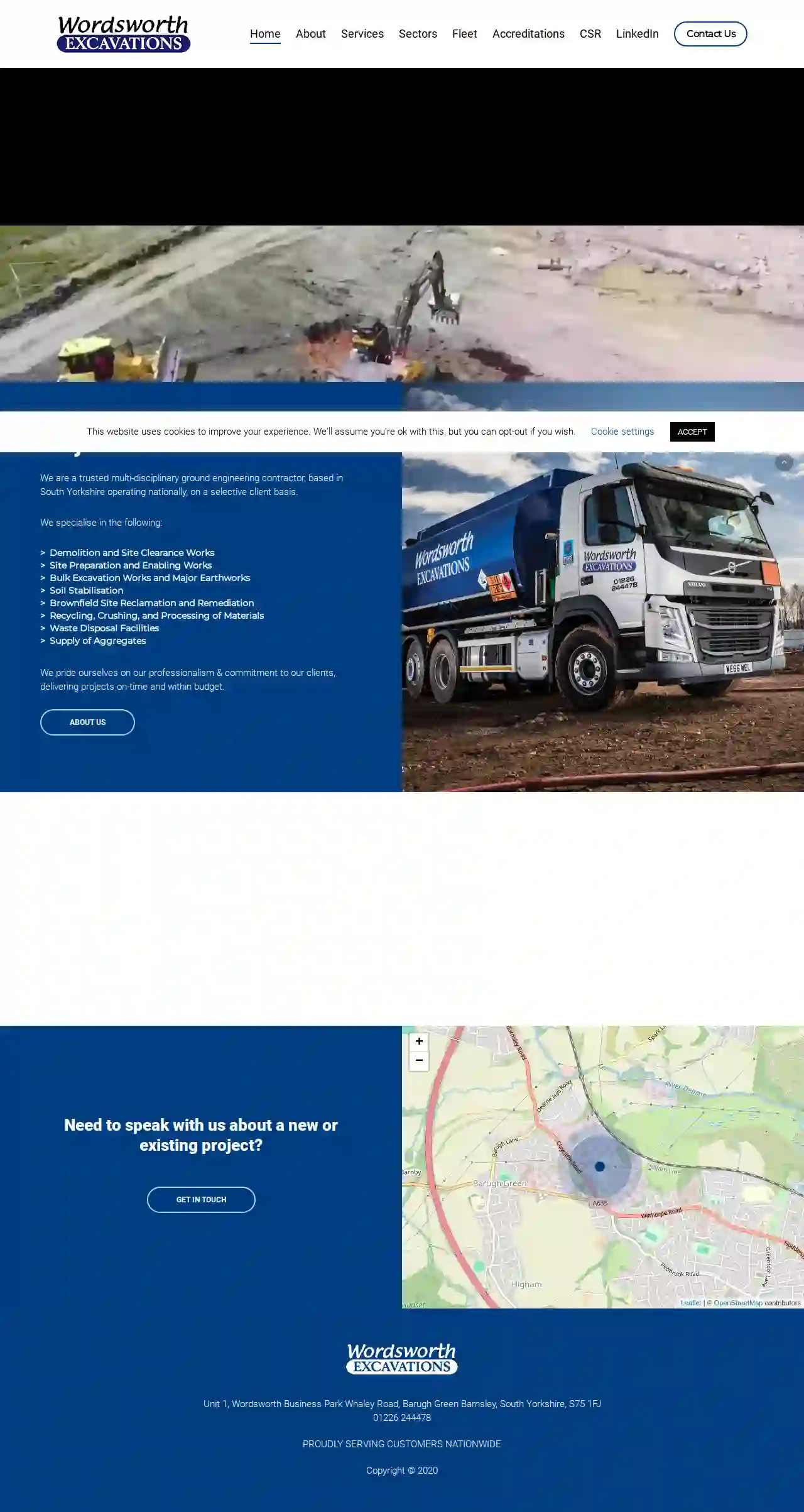Excavation Contractors Worsborough
Find top Excavating Contractors in Worsborough
Get up to 3 Excavation Companies quotes for your project today! Compare profiles, reviews, accreditations, portfolio, etc... and choose the best service.

Kt Excavations Ltd
51 reviewsUnit 71, Albion Road, Carlton Ind Est, Carlton, Barnsley, S71 3HW, GBFrom Ground Up, We're Your Trusted Partner. Professional Excavations & Groundwork Services in Barnsley Welcome to KT Excavations, your dedicated partners in bringing your projects to life. With many years of industry experience, we've honed our craft to deliver unparalleled quality, precision, and reliability. We have a strong team of skilled professionals who will work with you from site preparation to foundation laying, and so much more. Our comprehensive suite of services is tailored to meet the unique needs of each project, ensuring optimal results every step of the way. Whether you're a homeowner embarking on a residential construction project or a commercial developer undertaking a large-scale endeavor, we will deliver exceptional results that stand the test of time.
- Services
- Why Us?
- Testimonials
- Gallery
Get Quote
Braithwaite Excavations & Demolitions Ltd
3.73 reviewsBarnsley, GBThis domain name is parked for FREE by fasthosts.co.uk. Looking to buy a similar domain? Start search. Do more with your domain. Access all the tools you need for online success. Find out more. Need help? Our friendly experts are here 24/7 to answer your domain questions, from registering a similar domain to connecting your domain name to your site. Contact us.
- Services
- Why Us?
- Gallery
Get Quote
Jakto Transport Ltd - Excavations, Demolitions and Groundworks
4.814 reviewsBarnsley, GB- Services
- Why Us?
Get Quote- Ba
Barrett Excavation Ltd
56 reviewsBarnsley, GB- Services
- Why Us?
Get Quote 
Wordsworth Excavations
3.919 reviewsBarnsley, GB- Services
- Why Us?
Get Quote- G.
G.A.Siddons
4.25 reviewsBarnsley, GB- Services
- Why Us?
Get Quote - Og
Ogdens Excavation Ltd
52 reviewsBarnsley, GB- Services
- Why Us?
Get Quote - Ee
Eezi Dig Groundworks & Excavations
51 reviewsBarnsley, GB- Services
- Why Us?
Get Quote
Over 13,059+ Excavation Contractors on our platform
Our excavation contractors operate in Worsborough and surroundings!
ExcavationHQ has curated and vetted Top Excavation Contractors in and around Worsborough. Find a trustworthy contractor today.
Frequently Asked Questions About Excavation Contractors
- Planning and Surveying: Defining the excavation area, marking utility lines, and determining the required depth and grade.
- Site Preparation: Clearing vegetation, removing obstacles, and ensuring site accessibility.
- Excavation: Using appropriate equipment (excavators, backhoes, etc.) to remove earth and create the desired excavation.
- Hauling and Disposal: Transporting excavated material to designated disposal sites, complying with environmental regulations.
- Backfilling and Compaction: Refilling the excavation with suitable material and compacting it to achieve the required density and stability.
- Grading and Finishing: Leveling and shaping the surface to the final grade for landscaping or construction.
- Basement Size: The larger the basement, the more excavation is required, increasing the cost.
- Soil Type: Excavating rocky or dense clay soil is generally more expensive than loose soil.
- Accessibility: Difficult-to-access sites might require specialized equipment or more labor, driving up costs.
- Foundation Type: The chosen foundation type (full basement, crawl space, slab) affects excavation needs.
- Underpinning: If underpinning (strengthening existing foundations) is necessary, it significantly increases costs.
- Disposal Fees: Hauling excavated soil to disposal sites adds to the overall expense.
- Spring and Fall: Often considered favorable due to moderate temperatures and drier soil conditions.
- Summer: Can be suitable, but hot weather can make working conditions challenging and might require additional measures (shade, hydration) for workers.
- Winter: Excavation in winter can be more difficult due to frozen ground, snow, and potential delays caused by inclement weather. It might also require specialized equipment or techniques.
- Excavators: Versatile machines with a bucket, arm, and rotating cab for digging, lifting, and moving earth.
- Backhoes: Similar to excavators but with a digging bucket on the back and a loader bucket on the front, ideal for trenching and smaller excavations.
- Bulldozers: Powerful machines with a large blade for pushing earth, clearing land, and leveling surfaces.
- Skid Steers: Compact and maneuverable loaders with various attachments (buckets, forks) for digging, loading, and grading in tight spaces.
- Trenchers: Specialized machines for digging narrow trenches for utilities.
- Dump Trucks: Vehicles for hauling excavated material to disposal sites.
What is the excavation process?
How much does it cost to excavate a basement?
What is the best time of year for excavation?
What equipment is used for excavation?
What is the excavation process?
- Planning and Surveying: Defining the excavation area, marking utility lines, and determining the required depth and grade.
- Site Preparation: Clearing vegetation, removing obstacles, and ensuring site accessibility.
- Excavation: Using appropriate equipment (excavators, backhoes, etc.) to remove earth and create the desired excavation.
- Hauling and Disposal: Transporting excavated material to designated disposal sites, complying with environmental regulations.
- Backfilling and Compaction: Refilling the excavation with suitable material and compacting it to achieve the required density and stability.
- Grading and Finishing: Leveling and shaping the surface to the final grade for landscaping or construction.
How much does it cost to excavate a basement?
- Basement Size: The larger the basement, the more excavation is required, increasing the cost.
- Soil Type: Excavating rocky or dense clay soil is generally more expensive than loose soil.
- Accessibility: Difficult-to-access sites might require specialized equipment or more labor, driving up costs.
- Foundation Type: The chosen foundation type (full basement, crawl space, slab) affects excavation needs.
- Underpinning: If underpinning (strengthening existing foundations) is necessary, it significantly increases costs.
- Disposal Fees: Hauling excavated soil to disposal sites adds to the overall expense.
What is the best time of year for excavation?
- Spring and Fall: Often considered favorable due to moderate temperatures and drier soil conditions.
- Summer: Can be suitable, but hot weather can make working conditions challenging and might require additional measures (shade, hydration) for workers.
- Winter: Excavation in winter can be more difficult due to frozen ground, snow, and potential delays caused by inclement weather. It might also require specialized equipment or techniques.
What equipment is used for excavation?
- Excavators: Versatile machines with a bucket, arm, and rotating cab for digging, lifting, and moving earth.
- Backhoes: Similar to excavators but with a digging bucket on the back and a loader bucket on the front, ideal for trenching and smaller excavations.
- Bulldozers: Powerful machines with a large blade for pushing earth, clearing land, and leveling surfaces.
- Skid Steers: Compact and maneuverable loaders with various attachments (buckets, forks) for digging, loading, and grading in tight spaces.
- Trenchers: Specialized machines for digging narrow trenches for utilities.
- Dump Trucks: Vehicles for hauling excavated material to disposal sites.